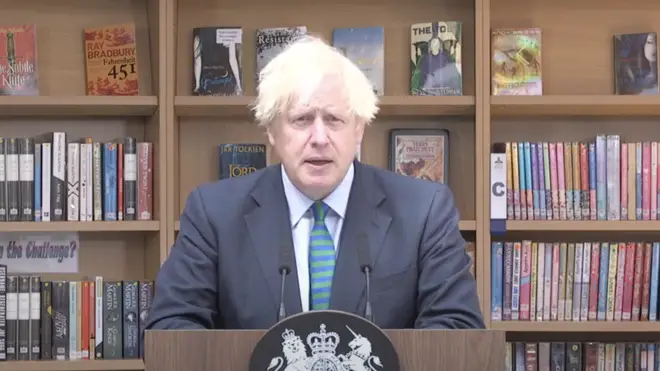
Richard Spurr 1am - 4am
26 August 2020, 14:34

Boris Johnson has blamed a "mutant algorithm" for the A-level results fiasco as he welcomed children back to school.
Addressing pupils across England on Wednesday, the prime minister said he understood how "stressful" results day must have been after it was almost "derailed" by the uncertainty.
He said he was now "very, very glad" that it had been "sorted out" having been decided that GCSE and A-level students would receive the grades initially predicted by their teachers.
READ MORE: What does the Government U-turn on A-level and GCSE exam results mean for students?
READ MORE: Watch again as Boris Johnson addresses school pupils ahead of return to classes
This was in reference to a dramatic U-turn from the government earlier this month in which it decided to scrap a grading system based on an algorithm devised by Ofqual.
The exams regulator revealed the algorithm had resulted in nearly two in five A-level grades in England were reduced from teachers' predictions.

PM explains face mask policy on visit to school
The prime minister, addressing pupils at a school in Coalville, Leicestershire, acknowledged that the situation had been "stressful" for those awaiting A-level and GCSE results.
"I'm afraid your grades were almost derailed by a mutant algorithm," he told them. "I know how stressful that must have been for pupils up and down the country.
"I'm very, very glad that it has finally been sorted out."
READ MORE: Small businesses urge Government to extend 'critical' Eat Out to Help Out scheme
Mr Johnson had previously claimed that the algorithm-based grades would be "robust" and "dependable".
His comments came as he highlighted the "irreplaceable" and "invaluable" quality of classroom interactions that could not be carried out amid the pandemic.
The "greatest risk" now facing school-age children is not the coronavirus, the PM said, but is the prospect of staying out of face-to-face education.

Nick Ferrari asks Gavin Williamson why public should trust government decision after another U-turn
"When you've been struggling with something in the classroom, some concept that you can't get, somebody, very probably a teacher, will say something and a light will go on; the clouds will lift and you will never forget that moment," he said.
"That moment is absolutely irreplaceable, it's invaluable and it can only happen in school.
"That's why education is the great equaliser, the liberaliser, the transformer of society."
READ MORE: Government has taken 'cautious and careful approach' on getting kids back to school
Schools are set to return next week amid pressure from teaching unions on the government to bring further clarity to the move, along with the rules around face coverings.
It comes after Scotland announced on Tuesday that all secondary school pupils will be required to wear masks between lessons.
The government was then prompted to change its policy in line with Scotland, advising children in year 7 and above to wear face masks in communal areas.
Listen & subscribe: Global Player | Apple Podcasts | Google Podcasts | Spotify
Speaking to Nick Ferrari on LBC on Wednesday, Gavin Williamson said the government has taken a "cautious and careful approach" on getting children back into schools.
Asked about public confidence following the U-turn, the education secretary said: "At every stage, what we're focused on is making sure all children return back to school in September.
"We don't want to be seeing children ... wearing masks in schools up and down the country, but in certain areas where it's necessary, where we're in local lockdown.
"This has been typical at every stage of this crisis that we have taken a cautious and careful approach welcoming children back to schools. I think that's what people expect and that's what we're doing in this instance.
"We've seen the move welcomed by unions in terms of clarity that it brings, because there was some concern in the teaching community, quite understandably, when they saw the advice come out from the World Health Organisation."
Mr Johnson later highlighted his belief of the importance in returning to school as he thanked students for staying home this summer during a unique situation.
He noted: "No previous generation of pupils has ever done [this] in our country."